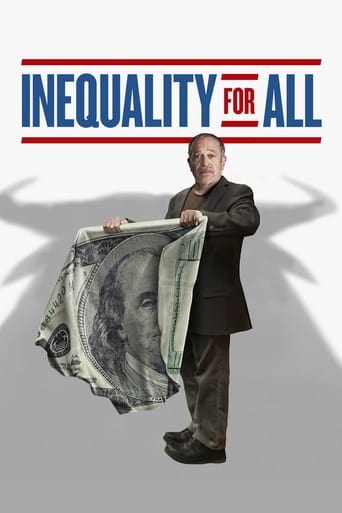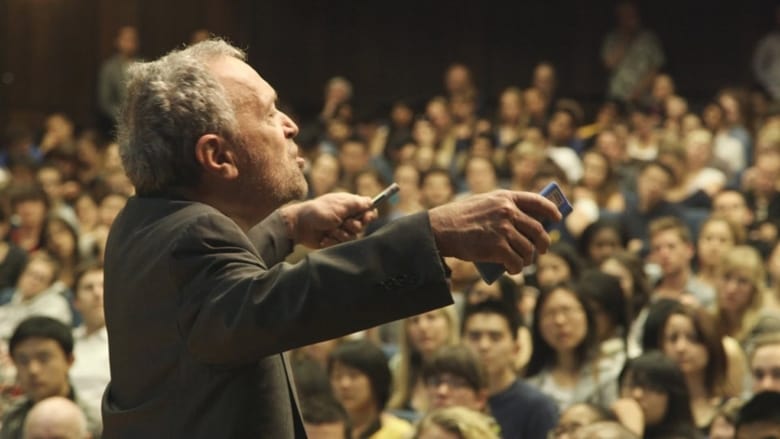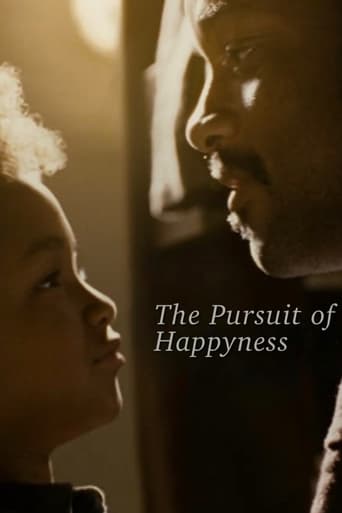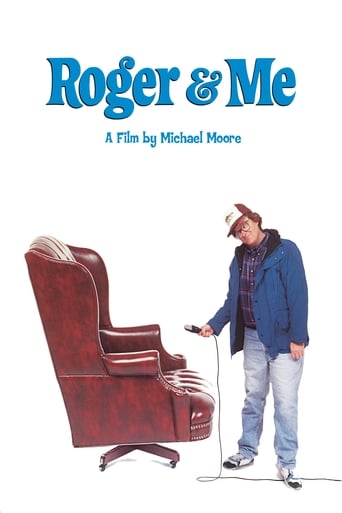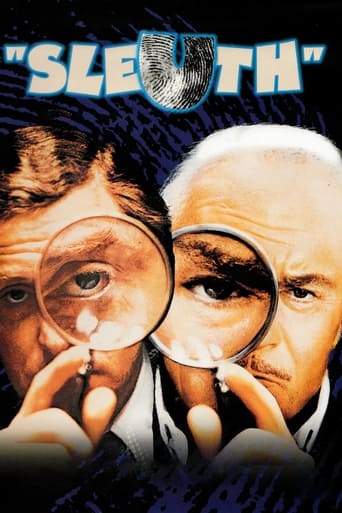Inequality for All (2013)
U.S. Labor Secretary Robert Reich tries to raise awareness of the country's widening economic gap.
Watch Trailer
Cast


Similar titles
Reviews
The movie's neither hopeful in contrived ways, nor hopeless in different contrived ways. Somehow it manages to be wonderful
Although I seem to have had higher expectations than I thought, the movie is super entertaining.
The movie's not perfect, but it sticks the landing of its message. It was engaging - thrilling at times - and I personally thought it was a great time.
An old-fashioned movie made with new-fashioned finesse.
Political commentator and former Clinton associate Robert Reich provides an overview of the widening economic gap in America in this humorously titled documentary. All too happy to make fun of his own short stature and often joking in his lecturers, Reich comes off as a likable personality, which in turn renders the film watchable throughout. Not everything that Reich has to say is particularly insightful (especially his notion that higher taxes for the rich would help), but he throws a few genuinely interesting ideas in the mix, such as that "the rich aren't generating enough economic activity" since their basic needs are the same as the average person and therefore they do not generally spend the majority of what they earn (everyone needs just one pillow is the example given). Reich includes some fascinating computer generated images too, though the film tends to rely heavily on these graphics. Likewise, the film spends too much time on Reich lecturing students at his university. All the reaction shots of his students' doting faces add nothing to his arguments, whereas more archive footage may have helped. In short, the film feels like a one-sided lecture rather than a persuasive documentary too often. The choice to end on an uplifting note comes across as odd too. As mentioned though, Reich is a charismatic enough character that the film still essentially works. The dire economic situation in America is certainly rather fascinating and even as a non-US citizen, it is interesting to see just how problematically this gigantic economic superpower actually works.
This is a documentary similar to "An Inconvinient Truth", where a (former) politician has a message he feels it is important to convey, and he conveys it in a personal but professional way. I am not from the US, and I was not familiar with Robert Reich - but what a delight he is! The best parts of the movie is where he breaks down the economic crisis in a way that is easily understandable, and manages to do it non-condescending way. Some of the clips from his media appearances were also quite fun.The way they bring in personal stories from other Americans is nice and touching. It helped underline the points made by Reich. At the same time, when a movie has such a strong agenda as this, it's hard not to watch it without your shield up (and you shouldn't, really). I am all for people using the medium to convey something personal, but when it's politics, it sometimes makes me feel a bit uneasy, as I know I am being "worked on". But still, from what I've read about Reich after seeing this movie, it seems to ultimately be a rather trustworthy account of what happened, and what can be done to stop it.That said, as a non-American, I often felt that this movie was not meant for me. I was not one of the people the documentary tries to convince. Obviously most of what is said is true and relevant globally - so it was not a waste for me to see it. But it still did not hit the mark, as I did feel "alienated" (too strong a word, maybe) at times.
Do you think it would catch their attention if we were to organize a national strike in which every individual making only minimum wage were to walk off their jobs on the same day across the nation? The fast food industries capture some headlines when they walked out and asked for $15.00 an hour. We need to hit them where it hurts if we are to get their attention, and since places like the Walmart's McDonals, and such can not function if there was a walk out since that is just about all they employ they would have to shut their door, and that would cost them.I watched your movie and found it to be very interesting. Unions need to be organized in these places, possibly of have representatives come to the places where these walk outs would take place. They have used the threat of firing people seeking to start or join a union, but if you make it into a massive event, they can't fire everyone. That would mean closing their doors indefinitely. There's power in numbers. I forgot to mention the the person they hired to replace me was half my age.We also need to also revisit the At Will employment act the allows employers to circumvent the anti discrimination laws by giving them the power to fire someone for any or no reason at all. A lot of companies are using a severance pay in which they require the employee to sign off any rights to come back at them for any reason, less they relinquish the right or pay back any severance pay paid them. Most decriminalization cases are all but impossible to prove when the reason for letting them go is listed as at will. And the individual is told this up front and that the employer will be notified of your claim, even before they determine if you have a claim.I'm over 40, and worked for the same company for more than 12 years. I had noticed that several people that like me were over 40 and had been with the company for some time being laid off periodically. And then they came to me and told me that I was being let go because they didn't have enough work for me. I was the oldest and most senior person in my department. My papers listed me as being released at will. They hired someone to replace me less than a month after letting me go claiming that they did not have enough work to accommodate that position. When I wrote them as my right, to ask for the reason for my termination, their reply was simply, I was at will and they were not saying anything beyond that. I've been out of work now for almost 2 years.
Inequality for All attempts to do for income inequality what An Inconvenient Truth did for the global warming/climate change debate. Immediately, if you agree with Reich's talking points about economics and who is exactly at fault for the economic downturn of recent years, you'll likely love Inequality for All and perhaps quote its statistical data in future debates. If you don't agree with Reich's points, you'll likely wind up hating the picture, dismissing it as biased, lefty-fodder and never think about it again. In other words, it's another typical political documentary in the regard that those who really need to see it and take things away from it probably won't.That doesn't mean Reich's commentary on this particular issue should be casually dismissed and regarded as biased senselessness. Reich makes several great points in this documentary, and the film is worth seeing on the merits that he is a charismatic and very likable screen presence. The fact that Reich assumes a tone that is witty and informative without being too didactic and pompous already makes the film much more accomplished than An Inconvenient Truth. For starters, Reich's background is in economics. He has studied the field for many years and has worked under the Ford, Carter, and Clinton administrations, working as the Secretary of Labor under Clinton. To dismiss Reich's claims immediately as lefty-fodder or something along those lines is criminal just because he is at least more experienced than many people reviewing this film. I can't dismiss Reich's claims, nor can I back them up. I can simply try and view eye-to-eye with him before moving on.Reich's film instantly feels like a PowerPoint presentation, with numerous infographs, charts, video clips, montages, etc appearing with Reich narrating and stating each piece of information's significance. This style makes for a basic, but very accessible film, which is what we need in the line of documentaries concerning politics and economics. They are topics that can get alienating and complex very easily, and Reich seems to be totally aware of that. What the man winds up doing, to combat the intimidating subjects, is offer a cleanly edited film, mixing in the aforementioned ingredients with bits of his lectures at Berkeley in order to create a very interesting and thoroughly entertaining film.Probably his strongest takeaway point, even if, I feel, many of us already know this, is that a strong middle class is the key to a strong economy. One of his wealthy subjects is Nick Hanauer, a venture capitalist who makes the bold assertion that the rich do not create jobs or benefit the economy in a way that is as significant as what the middle class does. He sums this up nicely, commenting that while some people make in excess of $10 to $30 million dollars a year, paradoxically, they spend very little of it. Most of their money goes into investments or into a vault for their savings. The middle class, on the other hand, can only donate so much of their money to savings because many of them have outstanding bills that need be paid by a certain day. Hanauer also comments that America needs to forgo the failed concept of "trickle-down economics" in favor of "middle-out economics," which is the pro-business ideology to create a strong, viable middle class akin to that of the 1940's, 50's, and 60's. The question is how do we get there? Reich's other strong takeaway point is that the American "free market" isn't completely free in a large sense. For better or for worse, depending on what you believe, the government has regulated the market with countless organizations that either limit production, tell us how to produce something, and work in efforts to regulate business in a way that makes it meet certain requirements. For some, this will be old news but for others, like me, it provides a moment to truly think about. There truly is not such thing as a free-market; the only one that would exist would be under complete anarchy with no regulations whatsoever.Director Jacob Kornbluth constantly makes an effort to show how baffling and simultaneously captivating Reich can be. At one point during Reich's presentation, he asks for an audience member's iPhone and questions to the masses where most of the proceeds from each purchase of an iPhone goes to. Many guess China and the United States, two countries directly involved in the solicitation and the manufacturing of said phone. It turns out 23% goes to Japan, 6% goes to the United States, roughly 3% goes back to China, something like 17% goes to Germany, and the remaining percent is scattered across the globe. The idea is that while iPhones are manufactured in one particular place (China), the parts for manufacturing just one phone come from all over the world, leaving many countries to share the profits unevenly.While Inequality for All is a good lesson in economics, the real treat is getting to know Reich, who stands tall at just four feet, eleven inches, loves his MINI Cooper car because it feels in proportion to himself, and always brings a small wooden box to stand on wherever he goes to speak. The guy is just nine miles past adorable, and, agree or disagree with his points in the film, he has enough charisma to brighten a room and enough intelligence that everyone can take away something he says by the end of the documentary.Starring: Robert Reich. Directed by: Jacob Kornbluth.

